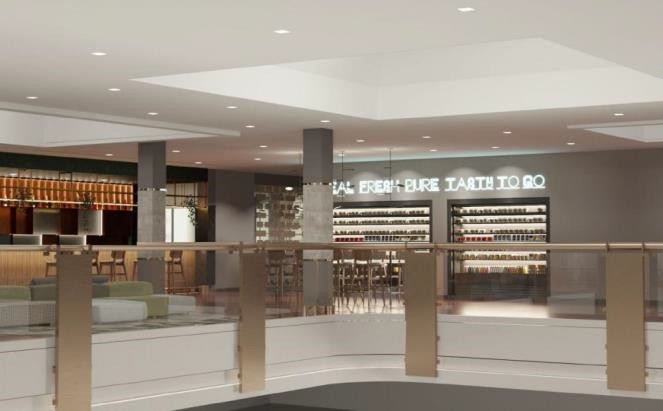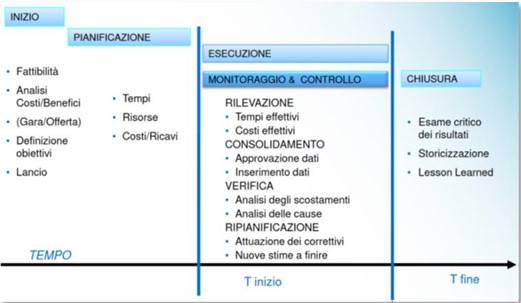AUTHOR: Ing. Michela Pergola
TUTORS: Ing. Giovanni Franchi e Geom. Ivan Carletti
INTERNSHIP: Ediltecno Restauri
MASTER: Master in “Project Management delle opere strutturali ed infrastrutturali” a.a 2020/2021
Ogni progetto rappresenta una sfida da affrontare on metodologie avanzate e risorse altamente qualificate, e realizzare progetti complessi richiede l’organizzazione e la gestione di innumerevoli variabili, per delineare e mantenere il percorso più efficace in termini di tempi, costi e qualità.
La figura centrale all’interno di un’organizzazione chiamata ad interpretare questo ruolo è il Project Manager, il quale attraverso competenze di risk management, value e cost engineering gestisce processi articolati al fine di raggiungere gli obiettivi prefissati ottimizzando le risorse, integrando gli input per raggiungere gli obiettivi. Il presente lavoro si pone come obiettivo quello di trasferire un’esperienza lavorativa all’interno del General Contractor Ediltecno Restauri S.r.l., realtà aziendale consolidata, presente sulla piazza della provincia di Milano, e operante su tutto il territorio nazionale, da 40 anni.
Un coordinamento globale di tutte le attività capace di includere, quali fasi principali, la pianificazione,
l’esecuzione e il monitoraggio di tutte le attività che compongono il Progetto. In questa logica di multidisciplinarietà, la scelta aziendale in merito al ruolo ricoperto dalla sottoscritta all’interno dell’organigramma aziendale, è ricaduto:
- in un primo periodo sulla gestione tecnico – amministrativa delle gare d’appalto, dove mi sono occupata di analizzare, documenti ricevuti dalla committente, inviare RDO ai fornitori per le richieste di offerta, impostare la tabulazione nei fogli di calcolo a fronte del quale viene ottenuto l’importo di gara; fondamentale è stato capire le dinamiche di come l’impresa valuta e analizza I costi e come ragiona in termini di utile su di una commessa che è quella della riqaulificazione dell’Hotel Quark Uno 1, a Milano;
- nei mesi successivi all’interno dell’Ufficio Acquisti dove fondamentale è stato cogliere del Progetto, le fasi di approvvigionamento, le connessioni esterne con i fornitori, dall’ analisi del budget disponibile, verifica della capacità costruttiva e contrattualistica adeguata ai contesti;
- infine come Site Director Assistent presso il Cantiere di riqualificazione dell’Hotel Quark Uno, sito a Milano.
La Gara d’appalto con le sue dinamiche e sviluppo, è da considerarsi a tutti gli effetti un progetto in quanto attività complessa, non ripetibile, dall’arco temporale ben definito e volta al raggiungimento di un obiettivo, con vincoli interdipendenti di tempi costi e qualità.
Durante lo studio della procedura di gara, è stato determinante seguire il presente modello per l’espletamento di una corretta e proficua procedura di gara, che si articola in quelli che sono i processi continui propri del Project Management:
- Controllo della documentazione
- Creazione di un file excel interno dove poter valutare tutti costi
- Invio delle RDO (richieste d’offerta) ai fornitori
- Studio della documentazione e sviluppo parte tecnica
- Ricezione delle offerte da parte dei fornitori, inserimento all’interno del file e valutazione delle
- Chiusura dell’offerta finale
- Compilazione file da restituire alla Committenza
- Consegna
Emerge chiaramente come i processi continui propri del Project management siano applicabili anche ad un progetto come la procedura di gara d’appalto, fatta proprio da momenti salienti riconducibili alle attività descritte. Le condizioni che favoriscono il controllo di un progetto sono:
- che il progetto sia stato ricondotto a componenti elementari più facilmente gestibili e controllabili (ad. esempio per fasi o sotto progetti) così come abbiamo visto nelle pagine precedenti;
- che il team dedicato sia competente ed autorevole nel pianificare, produrre reports, prendere decisioni e gestire le eccezioni;
- che esista un commitment (impegno) da parte dei responsabili delle risorse assegnate, della Direzione nell’attenersi a quanto prefissato
- che la qualità dei deliverable prodotti alla data sia accettabile e coerente con gli standard aziendali fissati
- che le risorse necessarie a completare le attività siano disponibili e opportunamente formate;
- che le motivazioni che hanno portato ad avviare il progetto rimangano valide per tutto il corso della procedura da espletare;
Uno degli aspetti maggiormente graditi dalle Committenti, è la capacità delle Imprese di ridurre i tempi di esecuzione delle opere.
Tale abilità deve essere dimostrata sul campo ma può essere anticipata mediante strumenti a noi conosciuti che in fase di offerta tecnica devono essere puntualmente adoperati al fine di far meglio comprendere che si ha piena contezza di quanto si sta facendo e piena professionalità nel farlo. La redazione di un Programma Lavori è uno strumento efficace per studiare la commessa nella sua interezza e complessità.
Questo aiuta a scomporre l’intero appalto per singole lavorazioni e a stabilire per ognuna delle attività, i tempi di realizzazione, mantenendo sempre fisso l’intero processo edilizio che subirà delle variazioni solo nel momento in cui varieranno le singole attività.
Durante la mia permanenza nell’ uff. Acquisti ho approfondito quella che l’ICBM 4 definisce: l’ area delle risorse, approvvigionamenti e partnership, ovvero l’area di competenza Practice. Il processo di acquisto si basa su due condizioni iniziali molto importanti, senza le quali i risultati saranno non solo negativi e controproducenti. Le due condizioni iniziali riguardano: poter disporre di accurate e complete descrizioni di cosa occorre comprare, le cosiddette specifiche tecniche e il tempo sufficiente per poter operare in modo professionale le fasi del progetto
La seconda fase più delicata è stata la negoziazione e l’accordo su termini contrattuali che soddisfano gli obiettivi di progetto; la non corretta e non completa gestione delle variabili del contratto espone il progetto a possibili costi extra, derivanti da molteplici cause; tra queste ricordiamo: ritardi di attività rispetto alle date programmate, l’insufficiente qualità e quantità delle forniture rispetto alle specifiche assunte, infine gli eventi la cui probabilità di accadimento non era stata correttamente valutata e quindi coperta in fase di planning.
In cantiere, presso l’ Hotel Quark Uno a Milano, è essenziale monitorare ciò che avviene giornalmente è accompagnata dalla redazione di un foglio Excel che mette in evidenza eventuali difformità rispetto a quanto previsto contrattualmente e che definiamo snag list interna; questo ci permette di avere piena coscienza di quanto accade e di come una lavorazione viene eseguita e di rispondere tempestivamente in caso di difformità.
Questi aspetti hanno contribuito fortemente a rendere il periodo formativo oltre che costruttivo in termini di competenze, stimolante in quanto orientato giorno per giorno al raggiungimento di obiettivi chiari e definiti. Certamente, come abbiamo potuto riscontrare, per arrivare ad essere invitati da Committenti di un certo livello, occorre a priori un grande lavoro dal punto di vista commerciale e di immagine; a questo però deve necessariamente seguire l’acquisizione materiale delle commesse, unico veicolo per arrivare a gestire cantieri di una determinata portata, maturare e affinare le competenze. Lavorare per progetti, e nel caso di un General contractor il progetto coincide con la commessa giudicata, significa lavorare per obiettivi e gli obiettivi possono essere correlati a fattori sociali, economici, competitivi, di funzionamento di un sistema, di un impianto di un’opera.
FOR INTERNATIONAL STUDENTS:
Each project represents a challenge to be tackled with advanced methodologies and highly qualified resources, and realising complex projects requires the organisation and management of innumerable variables, in order to outline and maintain the most effective path in terms of time, cost and quality.
The central figure within an organisation called upon to perform this role is the Project Manager, who through risk management, value and cost engineering skills manages articulated processes in order to achieve the set objectives by optimising resources,
The objective of this job is to transfer work experience within the General Contractor Ediltecno Restauri S.r.l., a well-established company, present in the square of the province of Milan, and operating throughout the national territory, for 40 years.
A global coordination of all activities capable of including, as main phases, the planning, execution and monitoring of all the activities that make up the Project. In this logic of multidisciplinarity, the company’s choice regarding the role played by the undersigned within the company organigramme has fallen:
- in an initial period on the technical-administrative management of tenders, where I was in charge of analysing, documents received from the client, sending RDOs to suppliers for requests for tenders, setting the tabulation in spreadsheets against which the tender amount is obtained; it was fundamental to understand the dynamics of how the company evaluates and analyses costs and how it reasons in terms of profit on an order which is the reqaulification of the Hotel Quark Uno 1, in Milan;
- in the following months within the Purchasing Department where it was fundamental to grasp the Project, the procurement phases, the external connections with suppliers, from the analysis of the available budget, verification of the construction and contractual capacity appropriate to the contexts;
- finally as Site Director Assistant at the Hotel Quark Uno redevelopment site in
The Tender with its dynamics and development, is to all intents and purposes to be considered a project as it is a complex, non-repeatable activity, with a well-defined time frame and aimed at achieving an objective, with interdependent constraints of time, cost and quality.
During the study of the tendering procedure, it was decisive to follow this model for the execution of a correct and profitable tendering procedure, which is articulated in what are the continuous processes proper to Project Management:
- Documentation control
- Creation of an internal excel file where all costs can be evaluated
- Sending RDOs (Requests for Offers) to suppliers
- Study of documentation and development of technical part
- Receipt of offers from suppliers, input into the file and evaluation of offers
- Closing of the final offer
- Compilation of files to be returned to the Customer
- Delivery
It clearly emerges that the continuous processes of project management are also applicable to a project such as the tender process, which is made up of precisely those salient moments that can be traced back to the activities described. The conditions that favour the control of a project are:
- that the project has been reduced to more easily manageable and controllable elementary components (e.g. by phases or sub-projects) as we have seen in the previous pages;
- that the dedicated team is competent and authoritative in planning, producing reports, making decisions and managing exceptions;
- that there is a commitment (commitment) on the part of the resource persons assigned, of the management to adhere to what has been set out
- that the quality of deliverables produced by the date is acceptable and consistent with established company standards
- that the resources required to complete the activities are available and appropriately trained
- that the motivations that led to initiating the project remain valid throughout the course of the procedure to be performed
One of the aspects most appreciated by clients is the ability of companies to reduce the execution time of works. This ability must be demonstrated in the field but can be anticipated by means of tools known to us, which must be used punctually in the technical tender phase in order to make it clear that one has full knowledge of what one is doing and full professionalism in doing it. Drawing up a Work Programme is an effective tool to study the contract in its entirety and complexity.
This helps to break down the entire contract into individual works and to establish for each of the activities, the timeframe for completion, always keeping the entire construction process fixed, which will only undergo changes as the individual activities change.
During my time in the uff. Purchasing I have delved into what ICBM 4 defines: the area of resources, procurement and partnerships, i.e. the Practice competence area. The purchasing process is based on two very important initial conditions, without which the results will not only be negative but also counterproductive. The two initial conditions relate to having accurate and complete descriptions of what needs to be bought, the so-called technical specifications, and sufficient time to be able to professionally work through the project phases.
The second, more delicate phase was the negotiation and agreement of contractual terms that meet the project objectives; the incorrect and incomplete management of the contract variables exposes the project to possible extra costs, resulting from multiple causes; these include: delays in activities with respect to the scheduled dates, the insufficient quality and quantity of supplies with respect to the specifications assumed, and finally events whose probability of occurrence had not been correctly assessed and therefore covered in the planning phase.
On site, at the Hotel Quark Uno in Milan, it is essential to monitor what is happening on a daily basis is accompanied by the preparation of an Excel sheet highlighting any deviations from what is contractually stipulated and which we call the internal snag list; this allows us to be fully aware of what is happening and how a job is being carried out, and to respond promptly in the event of any discrepancies.
These aspects strongly contributed to making the training period not only constructive in terms of skills, but also stimulating as it was oriented day by day towards achieving clear and defined objectives.
Of course, as we have seen, in order to be invited by Clients of a certain level, a great deal of work is required beforehand from a commercial and image point of view; however, this must necessarily be followed by the material acquisition of orders, the only vehicle for managing construction sites of a certain magnitude, maturing and refining skills. Working for projects, and in the case of a general contractor the project coincides with the judged job order, means working for objectives and the objectives may be related to social, economic, competitive factors, the functioning of a system, of a plant of a work.



